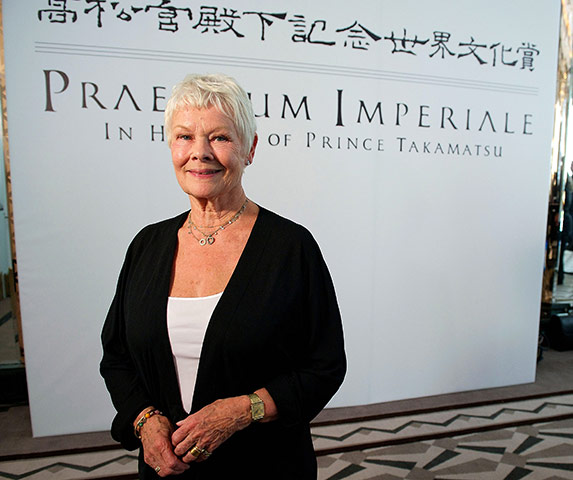An interview with Dame Judi Dench

Dame Judi Dench, Film and Theatre Laureate, spared some time at the Praemium Imperiale awards.
It must be nice to still be winning awards?
Indeed it is, I suspect it’s because they think I’m going to drop off the bows quite soon. But it is very very nice indeed.
I think it was a very strong descision to go ahead with the awards.
I quite agree. It was very questionable at one time, they didn’t know whether it should go ahead, but then Lord Patton said ‘Yes, you can get through everything’. I think it also shows that the arts and music, sculpture, architecture, painting transcend and speak to everybody, as Bill Viola said. It doesn’t matter if you don’t speak the language because we can all appreciate music. It’s a completely common language, and that’s a unifying thing, and that must be what Japan wants very much. They behaved so incredibly graciously after the disaster. And people apparently still go up the whole time and clear it. Ordinary people who lived there go back to the disaster and clear it but we never see any pictures of that happening, we never see any pictures of how far they’ve come, or how much it’s got better.
Have you had much to do with Japan?
I’ve had two quite long tours of Japan with the Royal Shakespeare company at the beginning of the 70s when met remarkable Japanese actors and people in the theatre there who we subsequently bought them over and stayed with us. One of the plays we did was twelfth night and we were told the reaction would be very very different, and indeed it was. The reaction was unbelievably quiet, and then at the end when you are thinking, ‘Oh they’ve had a rotten evening.’ they erupt. It was thrilling.
And we saw the Noh Theatre and the Kabuki, we saw people getting made up, and it’s a totally different culture. And I remember standing watching this man getting made up, and a young person came up and knelt down beside him and said a whole lot to him and he hardly took any notice. So I said afterwards ‘what was he saying?’ and we were told the young actor was saying ‘I’m not worthy to be on the stage with you, and I hope you will bear with me.’ And then of course there were a lot of wry remarks from our lot about somebody coming along and saying anything like that to us. But it was eye opening.
You also said you have a particular love of Shakespeare.
Yes, it’s universal Shakespeare, it’s translated into every language. I was in West Africa twice with children whose set books were MacBeth and Twelfth Night, and they’d never seen them performed. So we went out with John Neville and the Nottingham Playhouse Company and we performed them, and they all ran down to the stage when I asViola, and the boy playing Sebastian appeared, and completely stopped the show! And every time we spoke in any kind of rhyming couplets, for instance ‘the thane of Fife/had a wife’ used to bring the house down.
[With Shakespeare] one bad production sets it back, but we must go one telling these stories because they are thrilling, and if you see a wonderful production of something, and you’re mesmerised: my grandson is fourteen and he cannot see enough of Shakespeare.
Have you ever acted in Kabuki or Noh theatre?
Oh no, I would never be able to do that, I would die coming down the hanamichi [花道; literally flower path: a walkway which extends into the audience (Wikipedia)]. It’s a totally different thing, I could learn but I can’t imagine how long it would take. Nevertheless it feeds something in your psyche, and I’ve seen hundreds of times.
Has winning this prize strengthened your bond with Japan?
Well I shall go back to Japan and see some friends, I have a lot of Japanese actor friends out there, and directors. And Keita Asari (浅利慶太), head of the Shiki Company, who was incredibly kind to us the second time I found out I was pregnant and I wasn’t in Othello, so he sent us up to the Japan Alps for a few days, while there was a mini-earthquake in Tokyo, which my brother recorded on tape. Lamps started to bang together all the time, it was extraordinary.
1 comment